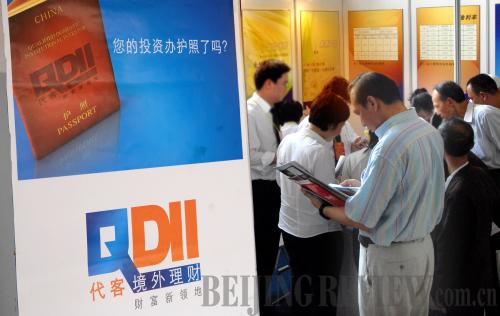|
 |
|
INVESTING ABROAD: Clients learn about overseas securities investment plans at a personal finance fair in Shanghai (CFP) |

Despite mounting concerns over default risks of U.S. Treasury bonds, China increased its holdings of these securities for the fourth consecutive month. The latest data from the U.S. Treasury Department, released in September, showed China purchased $8 billion additional Treasury bonds in July, following increases in April, May and June. China remains the largest overseas creditor of the U.S. Government. By the end of July, the country had held $1.1735 trillion in Treasury bonds, an increase of $13.4 billion over the end of last year and up $58.4 billion from a year earlier.
These increases would have been no surprise, had international financial markets remained tranquil. But they came at a time when Democrats and Republicans were embroiled in fierce disputes over the upper limit of the U.S. national debt. They were not able to reach a consensus until shortly before the August 2 deadline, a stalemate that sent global financial markets on a roller-coaster ride. Against this backdrop, the credit rating agency Standard & Poor's downgraded the United States' top-notch AAA rating for the first time ever.
When the debt ceiling debate was at its height, Republican lawmakers openly proposed the U.S. Government pay off only domestic creditors. Calls for "selective default" shocked foreign lenders. In this context, reports that China enlarged its U.S. Treasury bond holdings sparked widespread anxiety. But it should be noted that U.S. figures do not necessarily correspond to the quantity of Treasury bonds in China's official foreign exchange reserve investment portfolio.
The U.S. Treasury's International Capital System surveys investment from foreign governments as well as companies, residents and financial institutions. Its statistics therefore do not show whether bondholders are governments or private investors. Private Chinese investors have contributed greatly to recent rises in China's holdings of U.S. Treasury securities.
These nongovernmental market participants have reason to keep U.S. Treasury securities, long-term and short-term securities alike, in their foreign exchange asset mix. Chinese multinationals and financial institutions find they can gain higher returns from their idle dollar funds by purchasing foreign government bonds than simply putting them in the bank. U.S. Treasury securities have better liquidity than securities issued by any other foreign government. Their safety is supposed to be guaranteed by U.S. supremacy in the international monetary system, despite the U.S. Government's unsustainable practice of "robbing Peter to pay Paul."
Private Chinese investors have invested heavily in overseas securities, including U.S. Treasury securities, in recent years. China's flourishing foreign trade, coupled with the Chinese Government's incentive policies, has fueled the investment boom.
China launched a "qualified domestic institutional investor" scheme in 2006, allowing domestic institutions and residents to buy financial products overseas via mainland commercial banks and other financial institutions.
In 2010, private Chinese investors purchased $34.5 billion in overseas securities, including $19.9 billion in debt securities. In the first quarter of this year, investment in overseas securities reached $6.8 billion, including $3.6 billion in debt securities.
Since the Chinese Government published its first international investment position report in 2004, private investors' overseas securities investment has been on an upward spiral. Although total investment declined slightly in 2008 and 2009 under the impact of the global financial crisis, it picked up quickly in 2010, hitting $257.1 billion by the end of the year.
By the end of March this year, the figure had reached $263.5 billion, up $6.4 billion from the end of last year. Debt securities investment abroad totaled $200.3 billion by the end of March, an increase of $6.2 billion from the end of last year. Debt securities accounted for the majority of the increased overseas securities investment by private Chinese investors.
| 